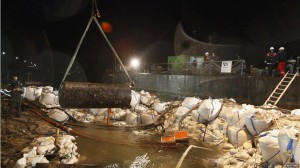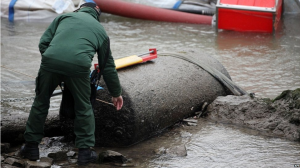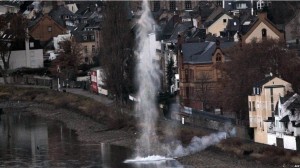 Drought strikes again, this time more aggressively than in Texas. A prolonged dry spell over the past few weeks has lowered the water levels of the Rhine. On November 20th, the receding river revealed two undetonated bombs from World War II in the Rhineland city of Koblenz. One bomb, a massive 1.8-ton Royal Air Force “blockbuster” (that’s 3,000 pounds of explosives), was spotted by residents from their balcony overlooking the Rhine. When authorities examined the area, they also found a smaller American 125-kilo bomb and a German smoke grenade. Koblenz was the headquarters for the command of Army Group B during World War II. It was heavily bombed by allied forces. Historians think the British bomb was dropped between 1943 and 1945.
Drought strikes again, this time more aggressively than in Texas. A prolonged dry spell over the past few weeks has lowered the water levels of the Rhine. On November 20th, the receding river revealed two undetonated bombs from World War II in the Rhineland city of Koblenz. One bomb, a massive 1.8-ton Royal Air Force “blockbuster” (that’s 3,000 pounds of explosives), was spotted by residents from their balcony overlooking the Rhine. When authorities examined the area, they also found a smaller American 125-kilo bomb and a German smoke grenade. Koblenz was the headquarters for the command of Army Group B during World War II. It was heavily bombed by allied forces. Historians think the British bomb was dropped between 1943 and 1945.
The size of the British bomb in particular required that 45,000 people, half the population of the city, be evacuated from the 1.8 kilometre exclusion zone in downtown Koblenz by Sunday morning. Each household received a leaflet advising residents to lock their homes, close their windows, lower the shutters, and leave the area carrying only any medicines they might need. Shelters were set up in seven public schools and all the patients in two hospitals, seven nursing homes and the inmates of the prison were moved out of harm’s way. Sunday morning authorities went door to door hustling any stragglers out of the exclusion zone.
 This evacuation is the biggest bomb disposal operation in Germany since the end of the war, and there have been many. The Rhine is full of bombs. There are estimated 3,000 unexploded bombs lying in wait under the topsoil of Berlin alone. Construction workers regularly stumble on bombs, and despite their age, these explosive devices can and do still kill. Last June three bomb disposal experts were killed and two injured during an attempt to defuse a 500-kilo World War II bomb unearthed in the construction of a stadium in Göttingen, and another three died a few months later while defusing a bomb in Lower Saxony.
This evacuation is the biggest bomb disposal operation in Germany since the end of the war, and there have been many. The Rhine is full of bombs. There are estimated 3,000 unexploded bombs lying in wait under the topsoil of Berlin alone. Construction workers regularly stumble on bombs, and despite their age, these explosive devices can and do still kill. Last June three bomb disposal experts were killed and two injured during an attempt to defuse a 500-kilo World War II bomb unearthed in the construction of a stadium in Göttingen, and another three died a few months later while defusing a bomb in Lower Saxony.
The three meter-long (10 feet) RAF “blockbuster” is the largest unexploded bomb found in Germany, and explosives in the detonator react with water over time becoming more volatile. That means there was a very real possibility that the blockbuster could have gone off, taking the experts and the center of the city with it, hence the exclusion zone. Of course today it was raining.
 They used a crane to build a damn out of sandbags around the bomb, then they pumped the water out, leaving the bomb exposed and defusable. They successfully defused the larger bomb first, then they defused the American one. The German smoke grenade was destroyed in a controlled demolition, which sent up a dramatic jet of water and smoke. Everything went according to plan and nobody was harmed.
They used a crane to build a damn out of sandbags around the bomb, then they pumped the water out, leaving the bomb exposed and defusable. They successfully defused the larger bomb first, then they defused the American one. The German smoke grenade was destroyed in a controlled demolition, which sent up a dramatic jet of water and smoke. Everything went according to plan and nobody was harmed.
Strategic bombing, still failing after all these years.